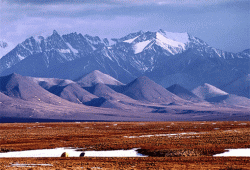 A University of Alabama scientist says global warming is not nearly as global as some people think.
A University of Alabama scientist says global warming is not nearly as global as some people think.With a global average temperature that was .54 F degrees warmer than seasonal norms, 2005 tied with 2002 as the second warmest year in the past 27, data processed at the university revealed.
Temperatures in 2005 followed a general pattern seen since 1978, with the most significant warming seen in the northernmost third of the planet. Large regions of slightly warmer than normal temperatures covered much of the globe.
The Arctic atmosphere, however, has warmed more than seven times faster than that over the southern two-thirds of the globe.
"It just doesn't look like global warming is very global," said John Christy, director of UAH's Earth System Science Center.
"The carbon dioxide from fossil fuels is distributed pretty evenly around the globe and not concentrated in the Arctic, so it doesn't look like we can blame greenhouse gases for the overwhelming bulk of the Northern Hemisphere warming over the past 27 years" he said. "The most likely suspect for that is a natural climate change or cycle that we didn't expect or just don't understand."
United Press International.